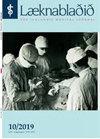[Transient Global Amnesia in the Reykjavik area].
IF 0.4
4区 医学
Q3 MEDICINE, GENERAL & INTERNAL
引用次数: 0
Abstract
BACKGROUND Transient Global Amnesia (TGA) is a benign syndrome characterized by sudden anterograde memory loss, that resolves spontaneously within 24 hours. TGA appears without other focal neurological symptoms. The aim of this study was to study TGA in the greater Reykjavik-area. METHODS We retrospectively analysed the medical history of patients with a diagnosis of TGA (ICD-10 G45.4) at the University Hospital in Iceland in 2010-2021. Medical records were reviewed, and information about year and age at diagnosis, sex, symptoms, precipitating events, imaging results and risk factors were collected. Statistical processing was performed with Excel and Rstudio. RESULTS Overall, 348 attacks of TGA were identified with a mean frequency of 29 attacks/year, where 9.9% had an earlier history of TGA. The mean age was 64.1, with 50% of subjects between 58-70 years old. The sex distribution was equal (49.9% female). Possible precipitating events were found in 53.7% of cases, with physical activity being the most common one (24.4%), followed by sudden temperature change and emotional stress. In 96% of patients a computerized tomography was performed (no sign of acute changes were found), and magnetic resonance imaging (MRI) in 36.2% of cases. MRI showed restricted diffusion in the hippocampal area in 10.3% of cases. DISCUSSION TGA is not a rare but a benign syndrome. Our findings regarding age, sex distribution and precipitating events were in accordance with other studies. TGA is thought to result from a temporary hippocampal dysfunction supported by the clinical presentation and MRI findings. The cause of TGA is however still unknown.[雷克雅未克地区的短暂性全局健忘症]。
背景:短暂性全局遗忘症(TGA)是一种以突然的顺行性记忆丧失为特征的良性综合征,在24小时内自行消退。TGA无其他局灶性神经症状。本研究的目的是研究大雷克雅未克地区的TGA。方法回顾性分析2010-2021年冰岛大学医院诊断为TGA (icd - 10g45.4)患者的病史。对医疗记录进行了审查,并收集了有关诊断时的年龄、性别、症状、突发事件、成像结果和风险因素的信息。使用Excel和Rstudio进行统计处理。结果共发现TGA发作348次,平均发病频次为29次/年,其中9.9%有早期TGA病史。平均年龄为64.1岁,50%的受试者年龄在58-70岁之间。性别分布均匀,女性占49.9%。53.7%的病例发现可能的促发事件,其中身体活动最常见(24.4%),其次是体温突然变化和情绪紧张。96%的患者进行了计算机断层扫描(未发现急性改变的迹象),36.2%的患者进行了磁共振成像(MRI)检查。MRI显示10.3%的病例海马区弥散受限。tga不是一种罕见的良性综合征。我们关于年龄、性别分布和突发事件的研究结果与其他研究一致。TGA被认为是由临床表现和MRI结果支持的暂时海马功能障碍引起的。然而,TGA的病因尚不清楚。
本文章由计算机程序翻译,如有差异,请以英文原文为准。
求助全文
约1分钟内获得全文
求助全文
来源期刊

Laeknabladid
MEDICINE, GENERAL & INTERNAL-
CiteScore
0.50
自引率
25.00%
发文量
63
审稿时长
>12 weeks
期刊介绍:
Læknablaðið er fræðirit sem birtir vísinda og yfirlitsgreinar og annað efni sem byggir á rannsóknum innan læknisfræði eða skyldra greina. Læknablaðið er gefið út af Læknafélagi Íslands. Blaðið er sent til allra félagsmanna. Það var fyrst gefið út árið 1904 en hefur komið samfellt út frá árinu 1915. Blaðið kemur út 11 sinnum á ári og er prentað í 2000 eintökum. Allt efni Læknablaðsins frá árinu 2000 er aðgengilegt á heimasíðu blaðsins á laeknabladid.is og er aðgangur endurgjaldslaus og öllum opinn.
 求助内容:
求助内容: 应助结果提醒方式:
应助结果提醒方式:


